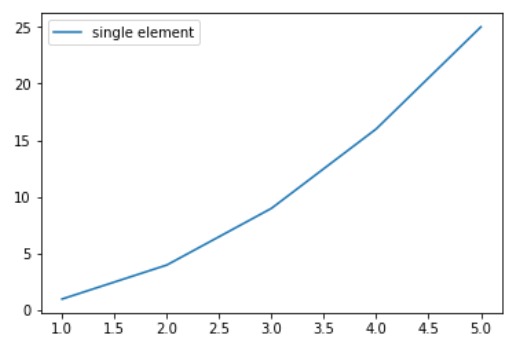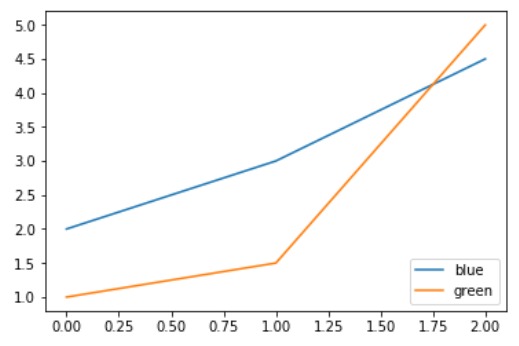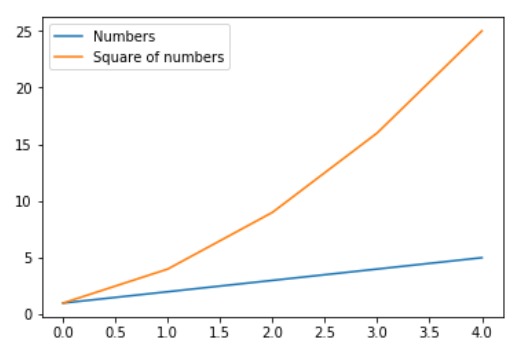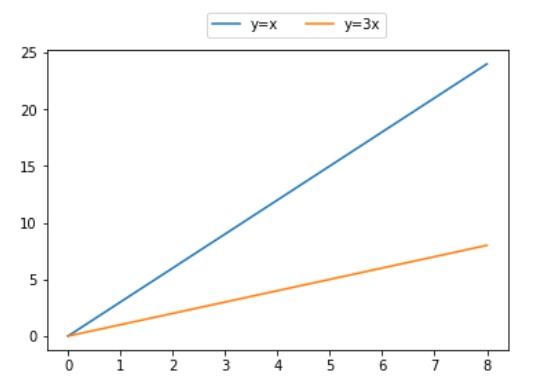Matplotlib是用于数据可视化的最受欢迎的Python软件包之一。它是一个cross-platform库,用于根据数组中的数据制作2D图。 Pyplot是使matplotlib像MATLAB一样工作的命令样式函数的集合。每个pyplot函数都会对图形进行一些更改:例如,创建图形,在图形中创建绘图区域,在绘图区域中绘制一些线条,用标签装饰绘图等。
Matplotlib.pyplot.legend()
图例是描述图形元素的区域。在matplotlib库中,有一个名为legend()的函数,该函数用于在轴上放置图例。
属性Loc inlegend()用于指定图例的位置。loc的默认值为loc =“ best”(左上方)。字符串“左上方”,“右上方”,“左下方”,“右下方”将图例放置在轴/图形的相应角上。
legend()函数的属性bbox_to_anchor =(x,y)用于指定图例的坐标,属性ncol表示图例具有的列数。默认值为1。
用法:
matplotlib.pyplot.legend([“blue”, “green”], bbox_to_anchor=(0.75, 1.15), ncol=2)
以下是函数的更多属性legend():
- shadow:[None or bool]是否在图例后面绘制阴影。默认值为“无”。
- markerscale:[无,整数或浮点型]图例标记与原始绘制标记的相对大小。默认值为无。
- numpoints:[无或整数]为Line2D(线)创建图例条目时,图例中标记点的数量。默认值为无。
- fontsize:图例的字体大小。如果值为数字,则该大小将是绝对字体大小(以磅为单位)。
- facecolor:[无,或“inherit”或颜色]图例的背景颜色。
- edgecolor:[无,或“inherit”或颜色]图例的背景色块边颜色。
在Python中使用legend()函数的方法-
范例1:
import numpy as np
import matplotlib.pyplot as plt
# X-axis values
x = [1, 2, 3, 4, 5]
# Y-axis values
y = [1, 4, 9, 16, 25]
# Function to plot
plt.plot(x, y)
# Function add a legend
plt.legend(['single element'])
# function to show the plot
plt.show()输出:

范例2:
# importing modules
import numpy as np
import matplotlib.pyplot as plt
# Y-axis values
y1 = [2, 3, 4.5]
# Y-axis values
y2 = [1, 1.5, 5]
# Function to plot
plt.plot(y1)
plt.plot(y2)
# Function add a legend
plt.legend(["blue", "green"], loc ="lower right")
# function to show the plot
plt.show()输出:

范例3:
import numpy as np
import matplotlib.pyplot as plt
# X-axis values
x = np.arange(5)
# Y-axis values
y1 = [1, 2, 3, 4, 5]
# Y-axis values
y2 = [1, 4, 9, 16, 25]
# Function to plot
plt.plot(x, y1, label ='Numbers')
plt.plot(x, y2, label ='Square of numbers')
# Function add a legend
plt.legend()
# function to show the plot
plt.show()输出:

范例4:
import numpy as np
import matplotlib.pyplot as plt
x = np.linspace(0, 10, 1000)
fig, ax = plt.subplots()
ax.plot(x, np.sin(x), '--b', label ='Sine')
ax.plot(x, np.cos(x), c ='r', label ='Cosine')
ax.axis('equal')
leg = ax.legend(loc ="lower left");输出:

范例5:
# importing modules
import numpy as np
import matplotlib.pyplot as plt
# X-axis values
x = [0, 1, 2, 3, 4, 5, 6, 7, 8]
# Y-axis values
y1 = [0, 3, 6, 9, 12, 15, 18, 21, 24]
# Y-axis values
y2 = [0, 1, 2, 3, 4, 5, 6, 7, 8]
# Function to plot
plt.plot(y1, label ="y = x")
plt.plot(y2, label ="y = 3x")
# Function add a legend
plt.legend(bbox_to_anchor =(0.75, 1.15), ncol = 2)
# function to show the plot
plt.show()输出:

相关用法
注:本文由纯净天空筛选整理自shardul_singh_tomar大神的英文原创作品 Matplotlib.pyplot.legend() in Python。非经特殊声明,原始代码版权归原作者所有,本译文未经允许或授权,请勿转载或复制。
